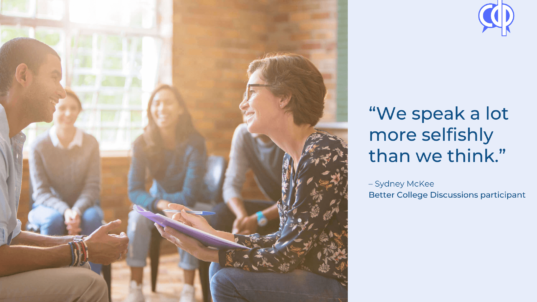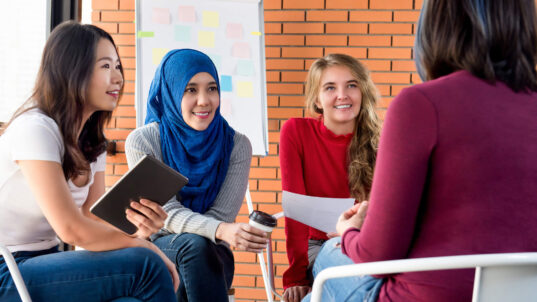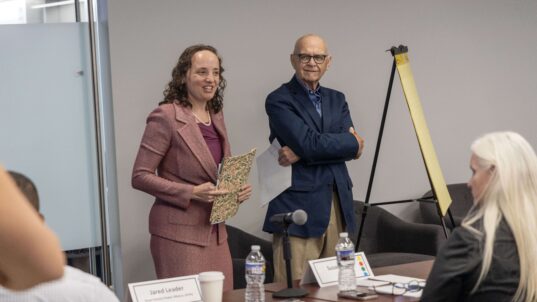How do we think better together? How do creative, culturally responsive, and critically informed discussions help us build stronger communities? How can we discuss better together to solve sticky problems? To help answer these questions, the Interactivity Foundation’s Collaborative Discussion Project (CDP) recently partnered with the Stavros Niarchos Foundation (SNF) Ithaca Initiative to deliver an interactive workshop at the University of Delaware’s Biden School of Public Policy and Administration. With the 2024 election season around the corner, the timing was ideal for participants to dive into the art of thoughtful, challenging conversations. As co-organizer Jane Case remarked, “We thought it would be the right time for people to focus on how to have thoughtful, difficult conversations.”
Led by Dr. Shannon Wheatley Hartman, SNF Ithaca Visiting Fellow and President of the Interactivity Foundation, the workshop aimed to strengthen what we call Collaborative Intelligence—the crucial skills needed to listen, reflect, and connect with others in today’s complex world. As faculty from diverse academic backgrounds gathered in the room, a sense of anticipation grew. “One thing that stood out was the range of attendees,” says Jane. “They were all excited to find adaptable resources that fit their fields.”
“One thing that stood out was the range of attendees. We had people from historic preservation, environmental justice, nonprofit leadership, and the co-curricular space—all excited to find adaptable resources that fit their fields.” – Jane Case
At its core, the workshop was about creating a culture where difficult conversations can thrive, laying the foundation for more productive discussions on—and beyond—the campus. It allowed participants to experience IF’s Collaborative Discussion Toolkit firsthand, engaging with activities designed to address real-world challenges, from managing groupthink to encouraging critical thinking.
“The workshop was about creating a culture where difficult conversations are the norm. We’re building a network, getting more people interested, and fostering those connections.” – Jane Case
“One of the big takeaways was the sheer excitement in the room. People were thrilled to know this resource exists, with clear objectives and adaptable activities,” noted Jane. The Toolkit activities Shannon selected encouraged attendees to consider how they might apply these tools in their own fields. “People left energized and ready to give these tools a try,” she added, “which really speaks to how engaging the session was.”
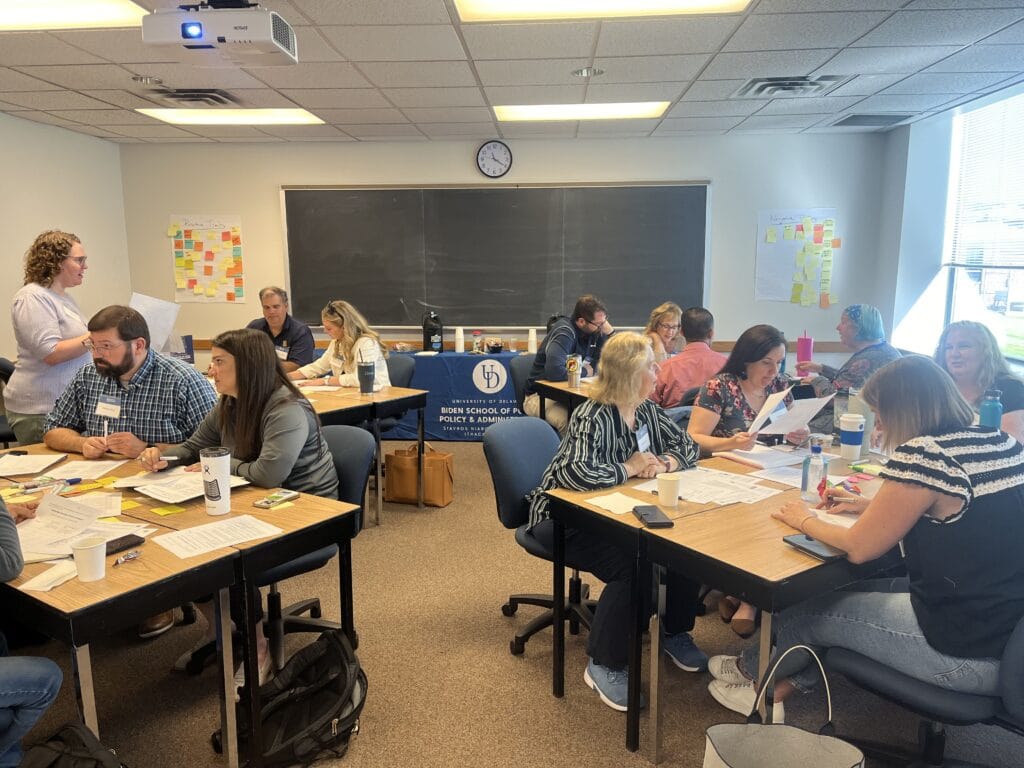
Fellow attendee Amanda Kelly Thompson, Program Coordinator at the Biden Institute and first-year PhD student in Energy and Environmental Policy, echoes Jane’s sentiment. “There were multiple take-aways I can immediately utilize as I educate, support, and work with students across campus, in addition to my day-to-day life. I’ve already implemented three of the resources for the course I’m teaching this winter session!”
Daniel C. Bottomley, PhD, Director of Public Diplomacy & Global Initiatives in the Department of Political Science and International Relations, also highlighted the workshop’s practical impact: “I found the Difficult Discussions Workshop to be immensely rewarding! It was wonderful to work in both small and large groups with colleagues focused on building inclusive dialogues, and I plan to use many of the lessons from the workshop to redesign how we handle group discussions in the classroom and beyond.”
“The Difficult Discussions workshop was an excellent resource for anyone to take, but especially for those working in higher education.” – Amanda Kelly Thompson
The session also served as a networking platform for participants, fostering connections and encouraging the exchange of ideas. With 16 engaged attendees in the room, the event marked the start of a growing community committed to creating space for these important discussions. “This workshop introduced people to others interested in these difficult conversations,” Jane noted. “It’s a step in building a community and creating a tipping point for more engaged dialogue on campus.”
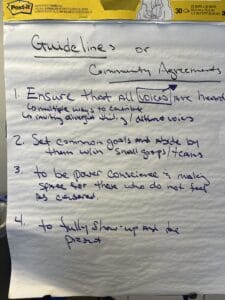
Shannon’s facilitation style played a key role in this success. As Jane put it, “Shannon has this disarming quality—she makes jokes, she connects easily with people. Her charisma kept 16 academics engaged for two hours, which is no small feat!”. This warmth, combined with a thoughtful use of facilitator tools—large post-its, small stickies, and markers—allowed participants to stay engaged without feeling overwhelmed. “They’re common in facilitator toolkits, but she used them so thoughtfully, keeping engagement up without it getting chaotic”.
By engaging faculty in Collaborative Intelligence, this workshop laid a foundation for future discussions that faculty can model and share with students. “My ultimate goal is for students to lead these opportunities—to empower them with these skills,” said Jane. “For this to grow, it needs grassroots support, and for us, that’s the students.”
Your Invitation to Collaborate
The Collaborative Discussion Toolkit is free and accessible to anyone interested in promoting more inclusive, thoughtful dialogue. If you’d like to introduce these skills in your own community or learn more about hosting a similar workshop, reach out to us or explore the toolkit.
👉 Start using the free Collaborative Discussion Toolkit
👉 Reach out for support running a session for your team or group

